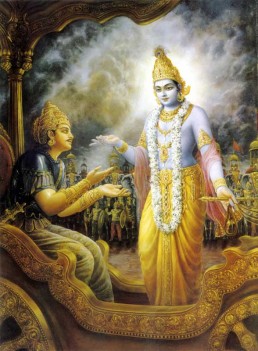Swami Chinmayananda
Swami Chinmayananda Commentary
Thus, the wise Kings of yore, such as Janaka and Ashwapati, had tried to attain Perfection, (Samsiddhi), by the ‘Path-of-Action.’ They were men of right understanding as they tried to liberate themselves through right actions performed in a spirit of detachment and self-dedication. They had set an example to the world by their achievement through an immaculate life of service.
Krishna means that Arjuna too, a prince by birth, and one who has taken upon himself the entire responsibility of mobilising and fighting the war, should respect his Prarabdha and act diligently without running away from the battle-field as he had earlier intended to do. This is the only method by which he can gain a complete vasana-exhaustion in himself. Born as a king, he had a greater responsibility towards the community, than any other member. Therefore, it was his duty that he should keep to his post and work diligently.
A creeper will never grow in a desert. It is nature’s law that every living creature finds itself in the most conducive outerworld conditions. Thus viewed, because of the very fact that he had manifested himself as a son of his father in the family of kings, nature had judged that the most conducive circumstance in life for Arjuna was the life of a prince, daring dangers, fighting enemies, and generally ordering peaceful and progressive growth for the society.
“WHO SHOULD SECURE THE WELFARE OF THE WORLD? AND HOW?” THE ANSWER FOLLOWS:
Adi Sankara Commentary
Hi, for; in the olden days, the leaned Ksatriyas, janakadayah, Janaka and others such as Asvapati; asthitah, strove to attain; samsiddim, Liberation; karmana eva, through action itself. If it be that they were possessed of the fullest realization, then the meaning is that they remained established in Liberation whlile continuing, because of past momentum, to be associated with action itself-without renouncing it-with a veiw to preventing mankind from going astray. Again, if (it be that) Janaka and others had not attained fullest realization, then, they gradually became established in Liberation through action which is a means for the purification of the mind. The verse is to be explained thus. On the other hand, if you think, ‘Obligatory duty was performed even by Janaka and others of olden days who were surely unenlightened. [Ajanadbhih: This is also translated as, ‘surely because they were unenlightened’.-Tr.] There by it does not follow that action has to be undertaken by somebody else who has the fullest enlightenment and has reached his Goal’, nevertheless, tvam, you, who are under the influence of past actions; arhasi, ought; kartum, to perform (your duties); sampasyan api, keeping also in view; loka-sangraham, [V.S.A gives the meanings of the phrase as ‘the welfare of the world’, and ‘propitiation of mankind’.-Tr. ] the prevention of mankind from going astray; even that purpose. By whom, and how, is mankind to be prevented from going astray? That is being stated: [In Ast. this introductory sentence is as follows:loka-samgrahah kimartham kartavyam iti ucyate.-Tr.]
The Bhagavad Gita with the commentary of Sri Sankaracharya – Translated by Alladi Mahadeva Sastry
Holy Geeta – Commentary by Swami Chinmayananda
The Bhagavad Gita by Eknath Easwaran – Best selling translation of the Bhagavad Gita
The Bhagavad Gita – Translation and Commentary by Swami Sivananda
Bhagavad Gita – Translation and Commentary by Bhaktivedanta Swami Prabupadha
Srimad Bhagavad Gita Chapter 3 – Verse 20 – 3.20 karmanaiva hi – All Bhagavad Gita (Geeta) Verses in Sanskrit, English, Transliteration, Word Meaning, Translation, Audio, Shankara Bhashya, Adi Sankaracharya Commentary and Links to Videos by Swami Chinmayananda and others – 3-20

